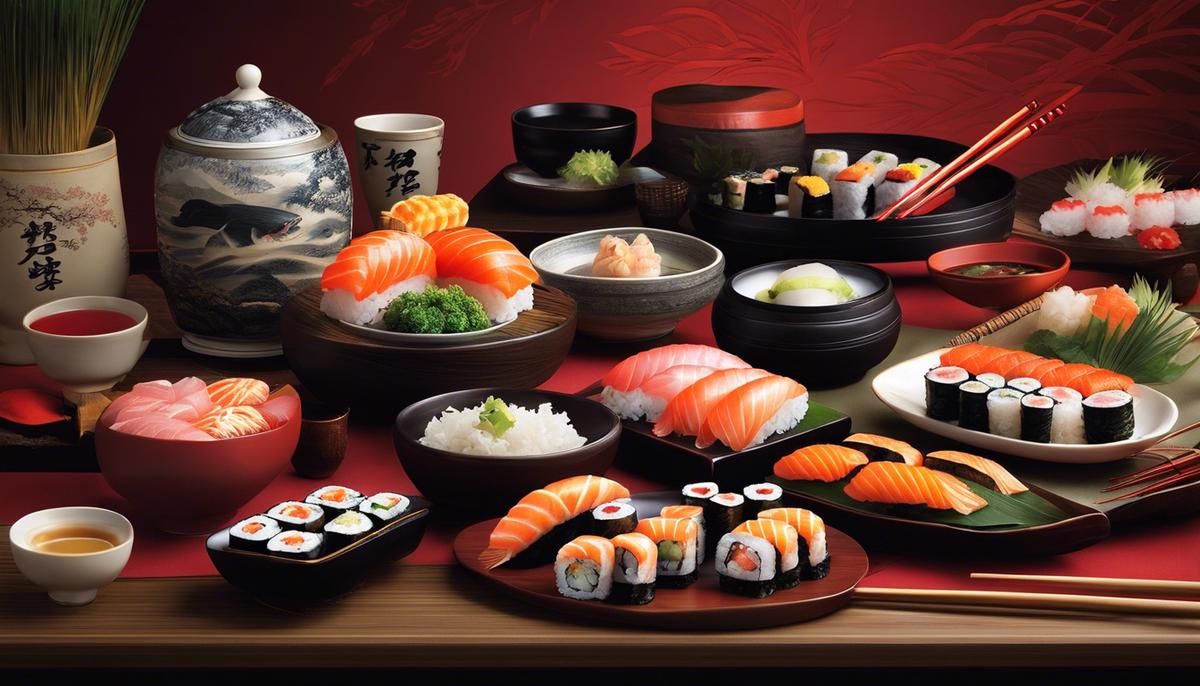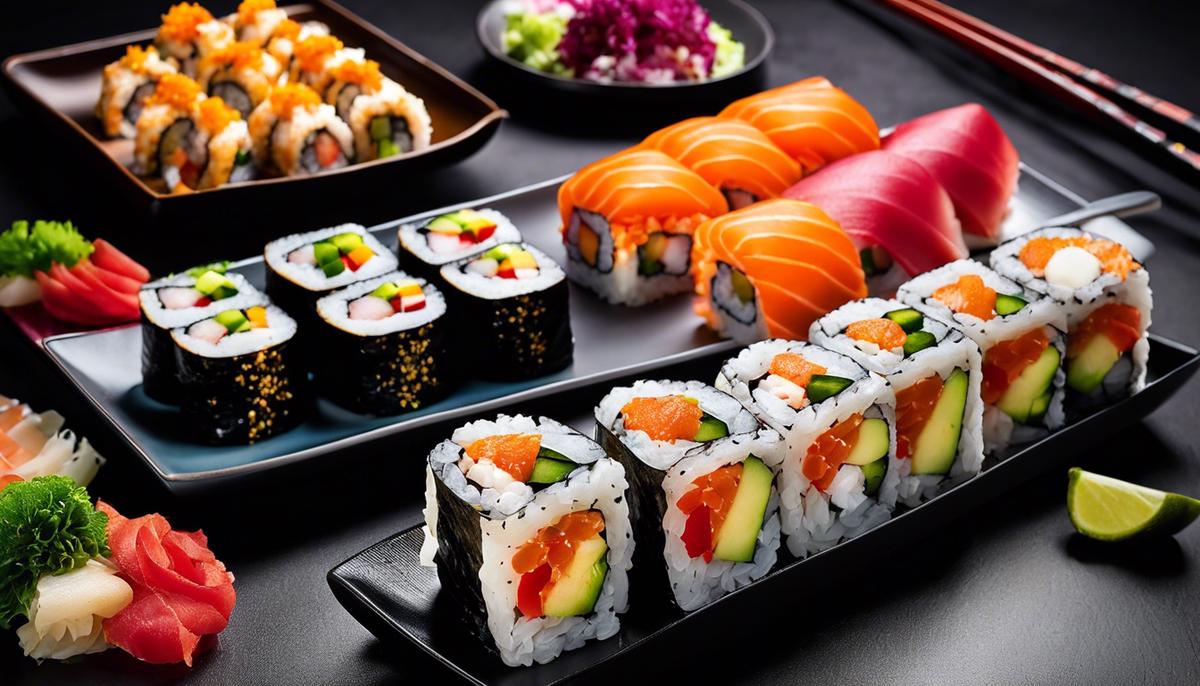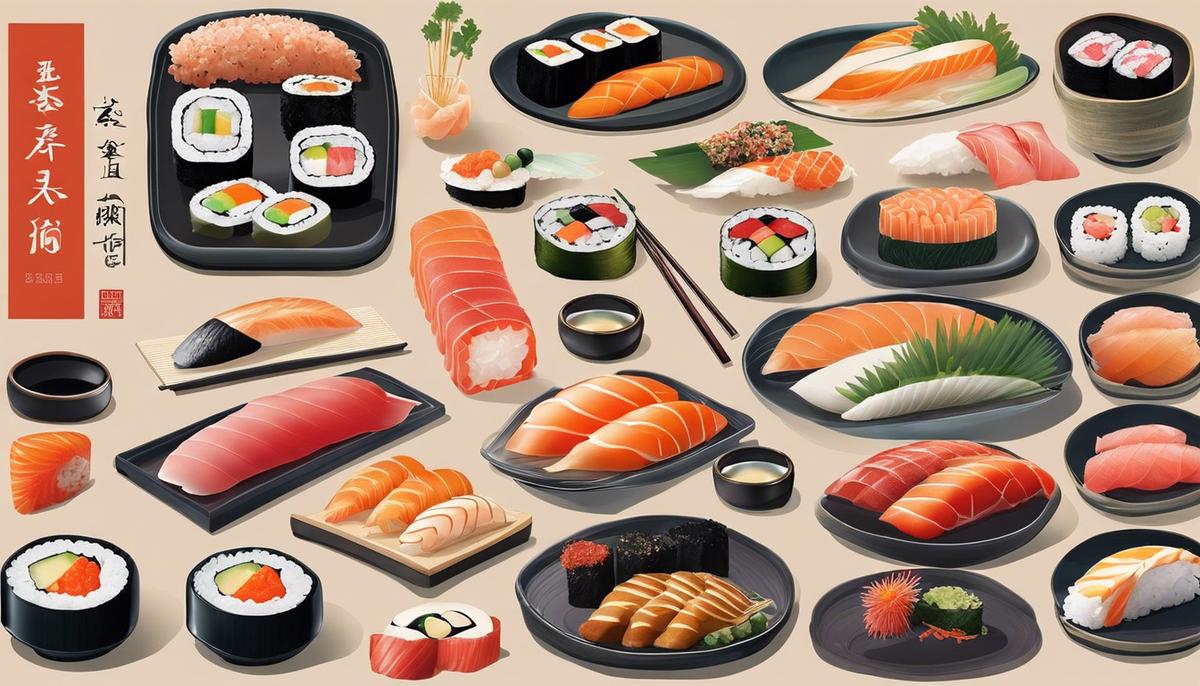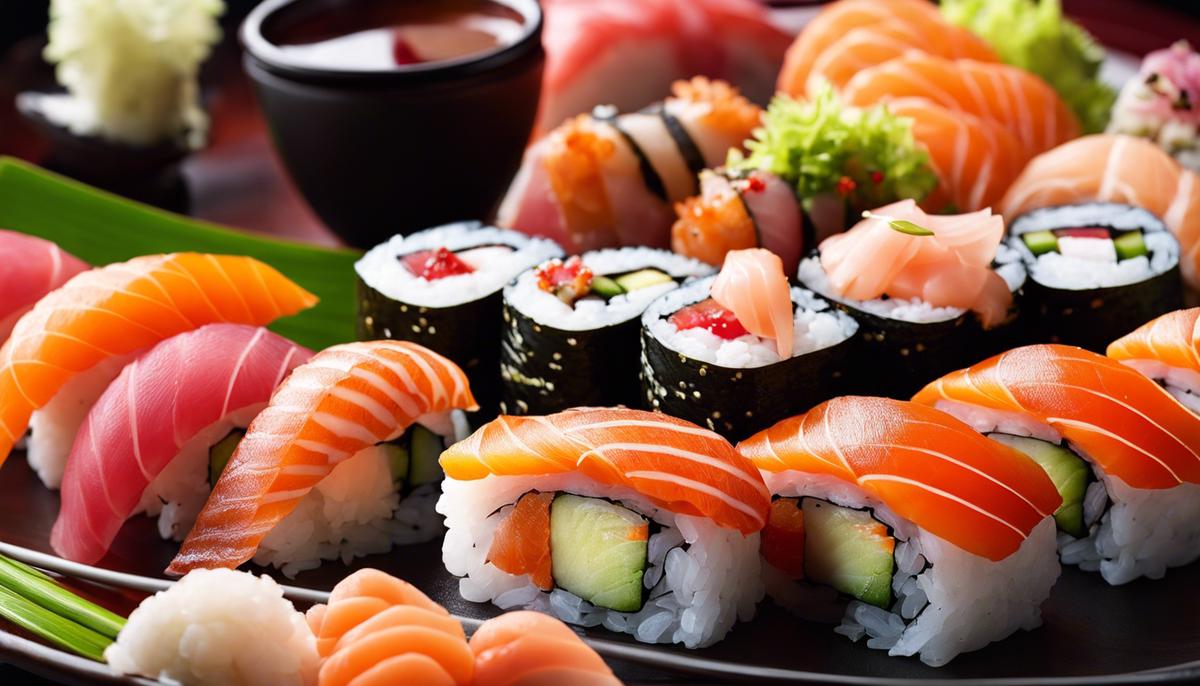In the diverse world of gastronomy, every dish has its unique story and sushi is no exception. A dazzling representation of taste and culture, the origins of this iconic dish are as rich and complex as its flavor notes. In this digression, we will take you on a journey through time and space to explore the origin and meaning of the word sushi. We examine linguistic evolution, how phonetic shifts and semantic changes have shaped the word sushi, and how it has embedded itself in modern pop culture.
The Origins of the Word Sushi
Title: The Hidden Origin of the Word ‘Sushi’
How wonderful it would be to enter the fascinating world of culinary art. Today we discover the origins of one of the most famous diamonds in this world – sushi. If you open Wikipedia, you will be informed that sushi has its origins in Southeast Asia. But the true origin of the concept and the word “sushi” is incredibly more interesting!
We are in the eighth century of Japan, in the age of Yayoi. Here we find the original meaning of the word “sushi”. Surprisingly, it has nothing to do with raw fish, as you might expect. The word “sushi” originally means “sour tasting” and refers to the vinegar rice used in making sushi.
The idea behind this method of preparation was to preserve fish in fermented rice. Due to fermentation, which made the fish crumbly and edible, it developed into a delicacy over time. Eventually, it was found that the fermented rice itself was also particularly tasty, and that’s how sushi as we know it today was born.
Today, sushi is a worldwide culinary phenomenon and refers to a variety of dishes that consist of vinegar rice and various other ingredients, including raw fish but also vegetables. However, the simplicity and subtlety of the taste of sushi is what makes it so irresistible.
So, in fact, the real art of sushi lies not in the fish, but in the preparation of the rice – a testament to the beauty and sophistication of Japanese cuisine and culture.
Although sushi is now known as a symbol of Japanese cuisine, its origin shows its deep connection with the foundation of all arts – experimentation, refining and perfecting. It’s fascinating to see how this humble way of cooking has found its way into the hearts of foodies around the world.
This is the end of the journey into the past of the word sushi. A simple word with a deep history that has literally changed our imagination and taste buds.
A tasty story, isn’t it? The next time you enjoy sushi, don’t forget to pause for a moment and appreciate the inherent beauty and science behind this truly global dish. Enjoy your meal!

The linguistic development of sushi
In the modern context, the term “sushi” has taken on a completely new connotation to a great extent.
What was once only one of the dishes of the so-called “blue collar” has moved into gourmet circles over the years and is now an integral part of every fine kitchen.
The transformation of sushi from everyday food to gourmet cuisine is fascinating.
Along with its evolved meaning, the pronunciation of the word sushi has also undergone a significant change.
Originally, sushi was pronounced more as if the ‘u’ would remain silent, comparable to the pronunciation of the word ‘sch’ in German.
Today, however, the ‘u’ in sushi has acquired a clear, distinct pronunciation that makes the word memorable and memorable.
The pervasive influence of Japanese culture, coupled with the universal enthusiasm for good food, has taken sushi – both in its pronunciation and meaning – in a very different, exciting direction.
The experimental variations of sushi served today reflect a synergistic fusion of tradition and innovation.
But despite its worldwide popularity and growing willingness to experiment, sushi hasn’t forgotten its roots.
It still carries the pride and respect for its deep history and the meticulously cultivated spirit of craftsmanship that can be seen in every role and bite.
It is this rarely achieved harmony between tradition and modernity that makes sushi such a unique culinary experience.
Whether in a fine restaurant in Tokyo, a trendy sushi spot in New York or at home, sushi always brings a piece of Japanese culture, history and modern lifestyle directly to the plate, invigorating the palate and senses in a wonderful way.
So the change in the meaning and pronunciation of sushi is more than just a linguistic allusion – it’s a reflection of the gastronomic growth, change and limitless possibilities that this wonderful world of food and pleasures offers us.

The influence of sushi on pop culture connotation
Sushi – A word that is now known and loved far beyond borders and oceans. But this culinary export hit is more than just a culinary delight, it also stands as a symbol of the era of globalization in which we live. What originally began as a quick street food for the workers in the fishing towns of ancient Japan has established itself as a cornerstone of fine dining. But how has the meaning of sushi changed over time and what influences has it had on the modern context?
The modern context is constantly expanding the meaning of sushi. Away from its traditional form – a combination of rice, fish and seaweed – sushi has become a canvas for culinary creativity. The process of “Japanization” and adaptation of sushi, by incorporating ingredients from different cultures, is a prime example of the fusion of tradition and innovation.
The sushi experience today goes far beyond just eating. It’s an experience that’s both a tribute to Japanese aesthetics and a reflection of modern city life. With clean lines and minimalist design, each piece of sushi creates an almost hypnotic visual effect that captivates the viewer, as well as the eaters.
With the global triumph of sushi, the word itself has undergone a journey of its own. The pronunciation has evolved over time, influenced by the different languages that have picked it up, thus contributing to its pop-cultural relevance.
Sushi also plays a significant role as an ambassador for Japanese culture, history and modern lifestyle. Despite its high recognition and wide range of interpretations, sushi has retained its roots and artisanal spirit, even in the experimentation of today’s chefs.
It is remarkable how a simple dish, consisting of rice and fish, has achieved global recognition, undergoing its own evolution in the process. It is a testament to the importance and influence of sushi on the gastronomic landscape and beyond, both in terms of its cultural significance and its ability to delight the palate. It shows the power of change and how a word can evoke a variety of meanings and associations that go far beyond its original definition.

The Global Expansion of the Word Sushi
From the makeshift street food stall of ancient Japan to a pillar of fine dining, sushi has made a remarkable journey. It is a fascinating transformation that bridges differences between the ancient and modern worlds, showing how a simple food preparation can become a symbol of refined gastronomy.
Today, sushi is much more than just a dish – it’s an aesthetic, an art form that combines clean lines and minimalist design. It is a visual experience that beguiles the senses and at the same time arouses culinary curiosity. With the integration of ingredients from different cultures, sushi sends a strong signal for the fusion of tradition and innovation in our globalized world.
Even on its worldwide journey, sushi has adapted its meaning and pronunciation while retaining its roots and craft spirit. It appears in a wide variety of contexts, from fine dining restaurants to pop culture references to lifestyle blogs. Sushi does not play a supporting role, but is in the spotlight as an ambassador for Japanese culture, history and modern lifestyle.
This global recognition and development is not only a remarkable achievement for a simply prepared dish of rice and fish. It also shows the immense cultural significance and ability of sushi to enchant the palate. Change is a constant companion that produces a variety of meanings and associations that go far beyond the original definition.
In high cuisine, where the outside is often just as important as the inside, sushi is a prime example of simplicity achieved in perfection – in the spirit of Japanese aesthetics. And so the little word “sushi” has received the stamp of globalization – a milestone on its own unique path, from the end of which we are hopefully still far away.

Sushi began its journey as a traditional Japanese delicacy and is now a global phenomenon that can be found in restaurants and kitchens around the world. The journey of the word sushi is a journey through time and culture that reveals its true meaning. It’s more than just a dish; it is a reflection of the change, adaptation and global interconnectedness that characterize the modern world. The linguistic, cultural and symbolic aspects of its heritage make the word sushi a vivid representation of global gastronomy.


